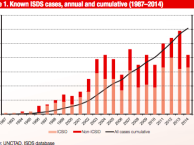TCE

S2B | 7-oct-2015
Why the Commission’s proposal for an “Investment Court System” still fails to address the key problems of foreign investors’ privileges

Green Agenda | 11-sep-2015
There has been an explosive increase of cases of investor-state dispute settlement (ISDS). Modern investor-state disputes often revolve around public policy measures and implicate sensitive issues such as health and environmental protection

Euractiv | 8-sep-2015
The European Commission will not ask EU judges to decide on the legality of the investor-state dispute settlement (ISDS) mechanism in free trade agreements.

El País | 7-aoû-2015
Spain has suffered its first setback in an international arbitration process over its cuts to renewable energy subsidies.

The Guardian | 10-jui-2015
Fifty years ago, an international legal system was created to protect the rights of foreign investors. Today, as companies win billions in damages, insiders say it has got dangerously out of control

The Ecologist | 25-mai-2015
In the rush to oppose TTIP we mustn’t lose sight of the context in which the deal is being negotiated — the hundreds of bilateral treaties that give corporations the right to sue in secret ’trade courts’.
Mots-clés:
actions | résistance ,
Argentine ,
Équateur ,
Éthiopie ,
investissement | TBI ,
litiges investisseurs-état | ISDS,
TCE ,
TiSA ,
TTIP

Jacobin Magazine | 15-mai-2015
Opponents of the trade deal being secretly negotiated between the United States, Australia, Brunei, Canada, Chile, Japan, Malaysia, Mexico, New Zealand, Peru, Singapore, and Vietnam have moved the discussion beyond its putative impact on jobs and growth and closer to the agreement’s broader ramifications, writes the IUF’s Peter Rossman.
Mots-clés:
actions | résistance ,
CPTPP ,
investissement | TBI ,
litiges investisseurs-état | ISDS,
réglementation ,
TCE ,
TiSA ,
TTIP

UNCTAD | 13-mai-2015
According to UNCTAD, 40% of all new ISDS cases in 2014 were initiated against developed countries (the historical average is 28%). A quarter of them are intra-EU disputes.

Global Arbitration News | 6-mai-2015
The Italian government has recently declared its withdrawal from the Energy Charter Treaty (“ECT”).

Kluwer Arbitration Blog | 1er-mar-2015
The Russian Federation filed three writs that seek to annul the award, alleging that the arbitrators did not fulfil their mandate personally because the Tribunal’s assistant played a significant role in analyzing the evidence and legal arguments.


